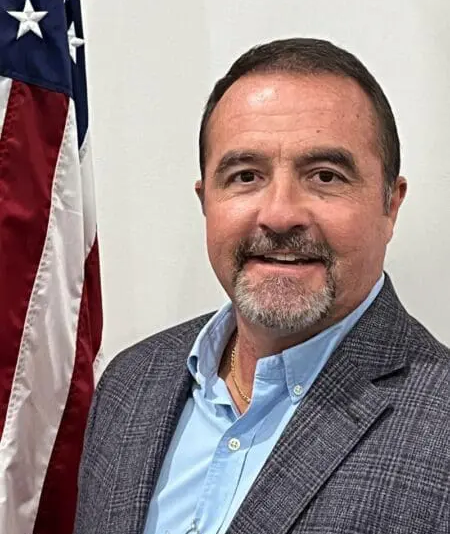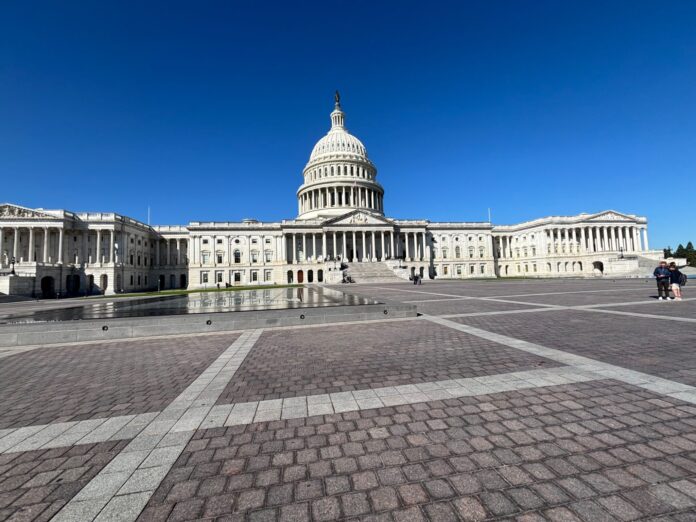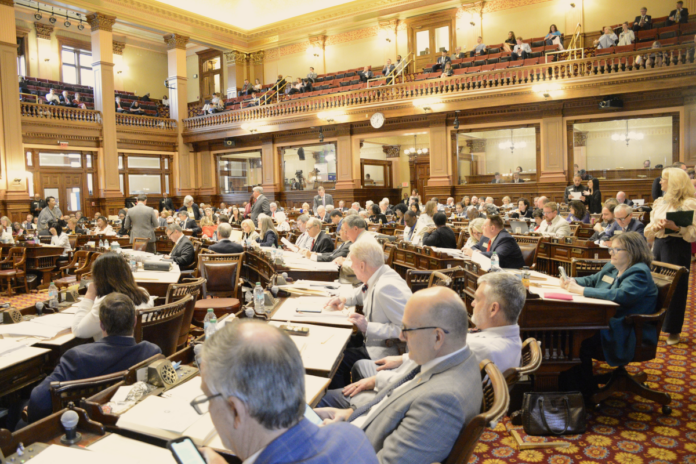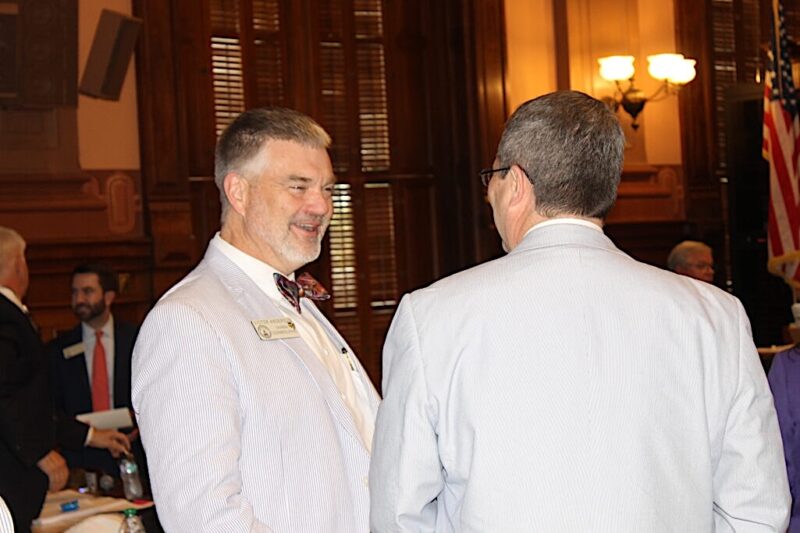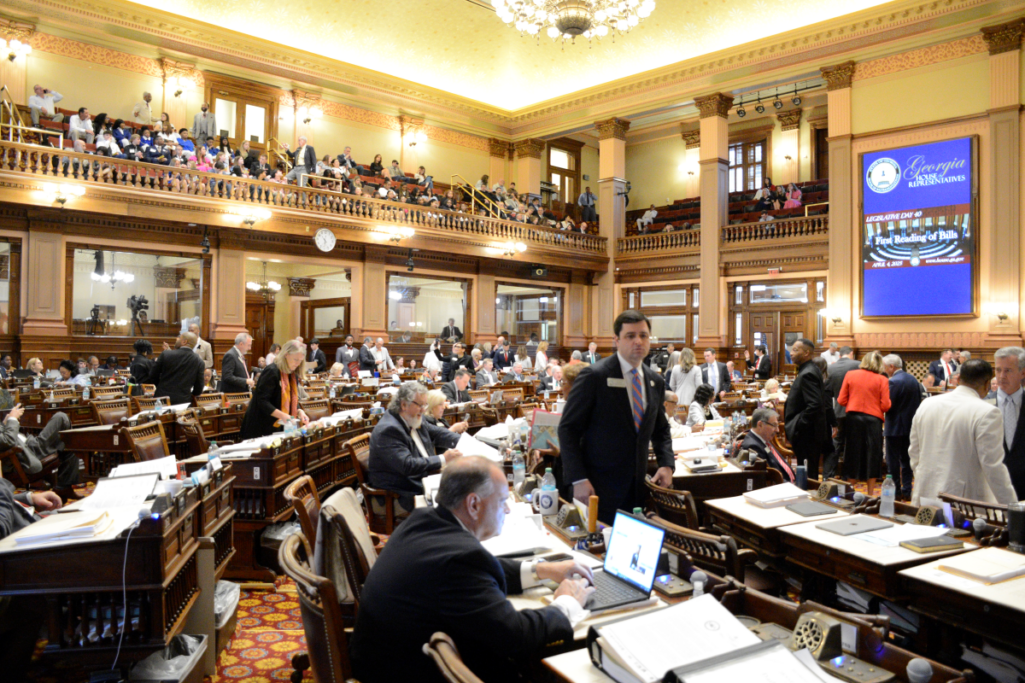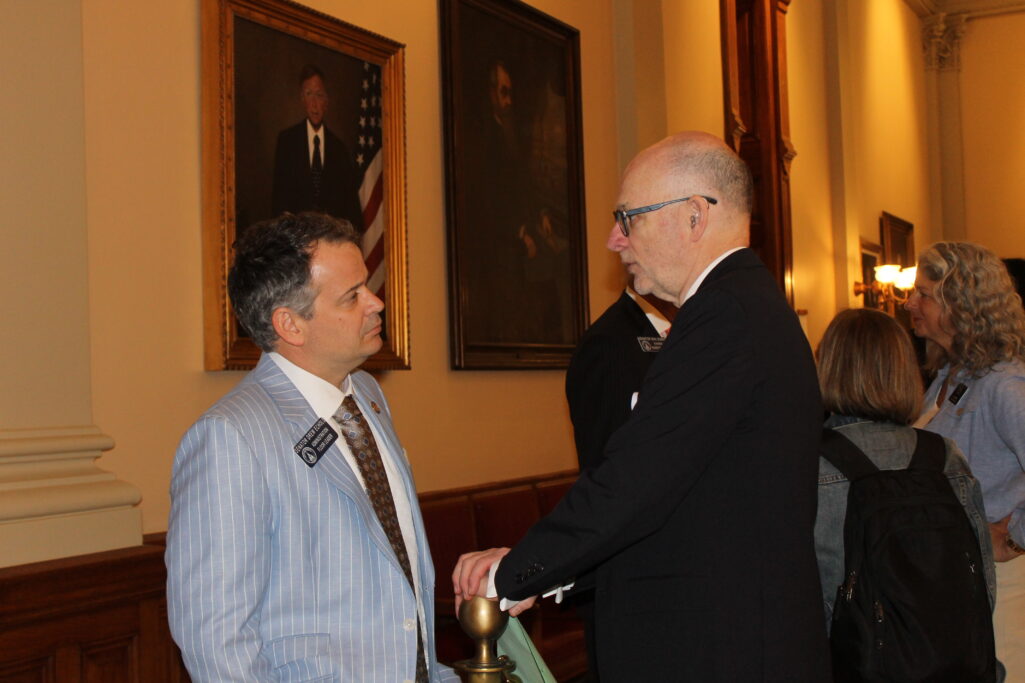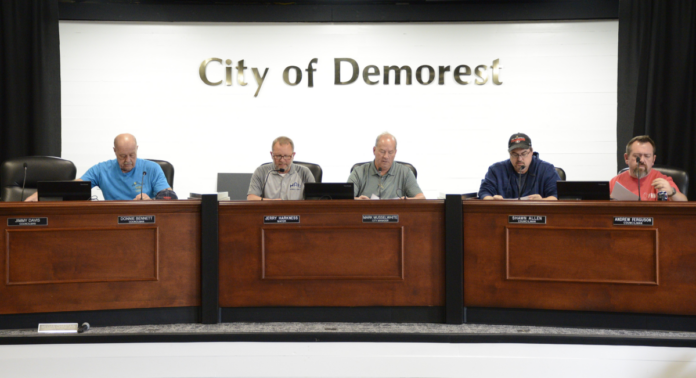WASHINGTON (States Newsroom) — U.S. House Speaker Mike Johnson postponed a vote on the budget resolution that was supposed to take place Wednesday as he tried to get the support of far-right members of the party who object because it won’t go far enough to achieve their goals of slashing government spending.
Johnson, R-La., said he hoped the House would be able to vote on the tax and spending blueprint Thursday, before leaving town for a two-week recess, though he didn’t rule out setting up a conference process with the Senate, or changing the budget resolution and sending it back across the Capitol.
“We are working through some good ideas and solutions to get everybody there,” Johnson said. “It may not happen tonight, but probably by tomorrow morning.”
Johnson’s comments came after he huddled behind closed doors for about an hour with more than a dozen far-right House Republicans who believe the budget resolution doesn’t require the Senate to cut enough spending.
“We want everybody to have a high degree of comfort about what is happening here,” Johnson said. “And we have a small subset of members who weren’t totally satisfied with the product as it stands. So we’re going to talk about maybe going to conference with the Senate, or adding an amendment. But we’re going to make that decision. We are going to continue to move forward. This is all positive.”
The House and Senate are far from agreement on how much to reduce federal spending later this year when they write the reconciliation bill.
The House instructions call on numerous committees to cut spending by at least $1.5 trillion, with more than half of that deficit savings coming from the committee that oversees Medicaid. Those instructions would likely lead to hundreds of billions in federal funding being pulled from the program, though Republicans insisted during floor debate they were only looking to address waste, fraud and abuse.
The Senate has given itself a floor of $4 billion in spending cuts, which could lead to substantial deficit increases. The nonpartisan Committee for a Responsible Federal Budget released analysis last week, showing the reconciliation package could bolster deficits by up to $5.8 trillion during the next decade.
Trump lobbying, last-minute drama
House debate, which took place before the vote was delayed, followed days of lobbying by House GOP leaders and President Donald Trump, who urged holdouts to adopt the budget resolution during a campaign fundraising dinner Tuesday evening.
“I think we are there,” Trump said. “But just in case there are a couple of Republicans out there, you just got to get there, close your eyes and get there. It’s a phenomenal bill. Stop grandstanding, just stop grandstanding.”
That didn’t sway everyone, however, leading Speaker Johnson to pull about a dozen of the far-right members off the floor Wednesday evening just as the House was supposed to move on to the budget vote.
The rest of the chamber’s lawmakers waited on the floor for more than an hour as the group huddled nearby.
Freedom Caucus Chairman Andy Harris, R-Md., Pennsylvania Rep. Scott Perry, South Carolina Rep. Ralph Norman, Tennessee Rep. Tim Burchett and Texas Rep. Chip Roy were among the members to get summoned off the floor by Johnson.
Scalise pleads to ‘get America back on track’
House Majority Leader Steve Scalise, R-La., called on Republicans to adopt the budget resolution earlier in the day during floor debate, saying it “just opens the door to” using the complex budget reconciliation process to enact their agenda.
“The process where 11 of our committees here in the House will go to work to start making improvements in so many areas to get America back on track,” Scalise said. “And ultimately, that’s why we all come here. We come here to solve big problems. We deal with small issues too. But every now and then — and it’s not often — you deal with a big issue that can actually improve the lives of families all across this country.”
Budget Committee ranking member Rep. Brendan Boyle, D-Pa., said members of his party wouldn’t allow the parts of the 2017 tax law that benefit the middle class to expire at the end of the year, rejecting claims from GOP lawmakers.
“If you’re a middle-class American, if you are in the 99%, you will not see your taxes go up next year,” Boyle said. “There is no question about that. What is at issue is the tax cuts for multimillionaires, billionaires and big corporations.”
Pennsylvania Republican Rep. Lloyd Smucker said he couldn’t vote to approve the budget resolution since the Senate’s instructions for spending cuts were “not acceptable.”
“To me, it’s important we have the guardrails in the initial resolution,” Smucker said, before encouraging House leaders to amend the budget resolution to increase the amount of spending cuts the Senate must implement.
“I can’t vote on this bill as it is, but there’s a path forward here and that is very, very important,” Smucker said.
Roy of Texas also spoke out against the budget resolution, saying the Senate’s instructions didn’t go far enough to reduce deficits.
“The Senate sent over a joke. And we’re going to capitulate to the Senate, knowing full well that the Senate instructions carry the day,” Roy said. “And we’re going to be sitting there in a reconciliation debate, where we’re going to end up on the short end of the stick. But worse, the American people are going to end up on the short end of the stick because it absolutely increases deficits. No one can deny it.”
Roy added that members of Congress should “pass a math test” because the numbers in the budget resolution didn’t add up.
Lengthy struggle
Republican leaders have struggled for months to get the vast majority of their members on board with the outline.
Even if the House finally approves the resolution, Johnson and Senate Majority Leader John Thune, R-S.D., have months of work ahead of them as committees begin writing and debating their sections of the reconciliation package.
The budget resolution tasks 11 House committees and 10 Senate panels with meeting vague budget targets. Committees either have a minimum amount of spending to cut or a maximum amount of deficits they can create.
The House and Senate are relatively aligned on some of those targets, though they are far apart on spending cuts and potentially tax policy.
In the House, the Agriculture Committee needs to slice at least $230 billion; Education and Workforce must reduce spending by a minimum of $330 billion; Energy and Commerce needs to cut no less than $880 billion; Financial Services must find at least $1 billion in savings; Natural Resources has a minimum of $1 billion; Oversight and Government Reform has a floor of $50 billion; and the Transportation Committee needs to reduce deficits by $10 billion or more.
The Energy and Commerce Committee’s instructions have been a central issue for Democrats, and many centrist Republicans, who are concerned that Medicaid, the state-federal health program for lower-income people, will be a target for hundreds of billions in cuts.
Four Senate committees — Agriculture, Nutrition, and Forestry; Banking, Housing and Urban Affairs; Energy and Natural Resources; and Health, Education, Labor and Pensions, or HELP — must each find at least $1 billion in spending cuts over the 10-year budget window.
House committees that can increase the federal deficit include the Armed Services Committee with a cap of $100 billion in new spending, Homeland Security with a $90 billion ceiling for new funding for programs it oversees, Judiciary with a maximum of $110 billion and Ways and Means, which can increase deficits up to $4.5 trillion for tax cuts.
Senate committees also got instructions for increasing the deficit, which will allow them to spend up to the dollar amount outlined in the budget resolution. Those committees include Armed Services at $150 billion; Commerce, Science and Transportation with $20 billion; Environment and Public Works at $1 billion; Finance with $1.5 trillion in new deficits, likely for tax cuts; Homeland Security at $175 billion and Judiciary with $175 billion.
House instructions call for the reconciliation package to raise the debt limit by $4 trillion while the Senate’s plans say lawmakers can raise it by up to $5 trillion.
Slim majority
Assuming the House adopts the budget resolution, GOP leaders will need to keep nearly all of their members supportive during the next couple months as those numbers turn into tangible policy proposals.
House Republican leaders can only lose three members on party-line votes, given their paper-thin 220-lawmaker majority.
The same number of GOP senators can vote against the final reconciliation package as long as Vice President J.D. Vance casts the tie-breaking vote.
Any more Republicans opposing the package would prevent it from becoming law.


